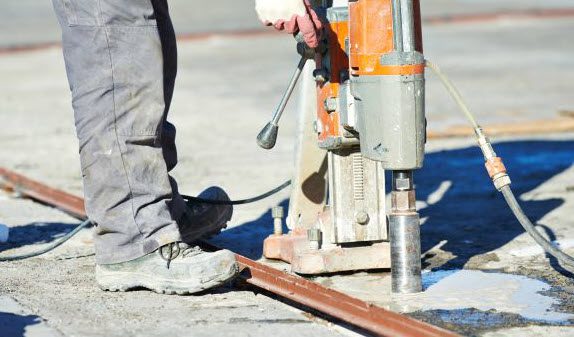
No doubt you have your favorite tools and accessories for drilling concrete. But have you ever wondered about diamond core bits vs carbide core bits? Which is the best bit for concrete?
In this article, we’ll explain some key differences between these two bit types. But first let’s look at what to consider when drilling into concrete.
Special Considerations for Drilling Concrete
Before choosing between diamond core bits and carbide ones, it’s important to consider a few key factors associated with your drilling job.
Type of Concrete
There’s a difference between working with concrete blocks versus poured concrete. The concrete’s psi and aggregate mixture is also a factor that could have a significant impact on the life of your bits.
Cure State
Concrete that is still “wet” (i.e., not fully cured) is easier to drill into than fully cured concrete and will give you a smoother end result.
Hole Diameter Required
A hammer drill can drill up to 12 mm, while a rotary hammer can drill up to 100 mm diameter. Larger holes will require a non-impact core drill.
Wet or Dry Drilling
Wet drilling keeps the drill bit cooler and your job moving faster, but you’ll need to be sure there aren’t any power lines nearby.
Vertical versus Horizontal Drilling
Some larger drills may be difficult or impossible to use against a vertical surface.
Now let’s consider the question of diamond core bits vs carbide core bits. It turns out that one of them really is the best bit for concrete.
Carbide Core Bits for Concrete Drilling
Typically, carbide core bits are solid tungsten carbide, though some are metal with tips covered in a tungsten carbide cement. These bits are stronger than hardened steel, but not quite as durable as diamond bits. For example, carbide can’t drill through rebar or steel, so it may very well slow down your job if you find yourself needing to change bits.
Another factor to consider is that carbide core bits require coolant to prevent overheating. The powdered concrete dust will mix with the coolant and create a sludgy mess. If you’re working near a power source, this is risky.
Drilling Concrete with Diamond Core Bits
When it comes to drilling concrete with diamond core bits vs carbide core bits, it turns out that diamond is the best bit for the job. Although diamond core bits are more expensive than carbide, they tend to last much longer.
These bits have a thin layer of diamond dust that is extremely abrasive. Diamond dust grinds away at the concrete, resulting in a much smoother cut than you’ll get using carbide. And unlike carbide, they’ll cut through rebar and steel with ease.
Another benefit of diamond is that it’s better at getting rid of the heat that’s caused by the motion of the drill bit. This means you can work faster than you could with a carbide core bit.
Getting the Most Out of Your Diamond Core Bit
Clearly diamond is a highly durable material, but there are a few steps you can take to extend the already longer life of your bits:
- After use, let the bit cool down, then wipe it clean.
- Carry the bits in a case that holds them securely, minimizing any friction that could wear at the diamonds.
- Store bits in a dry location.
There’s Nothing Like Diamond!
Diamond Products is a manufacturer with a strong reputation for making specialty concrete tools. Not only do they make core drills and bits, they also manufacture concrete cutting tools for cutting and sawing.
Our 35-year partnership ensures you have the best selection and prices for Diamond Products. Contact us for a quote.



